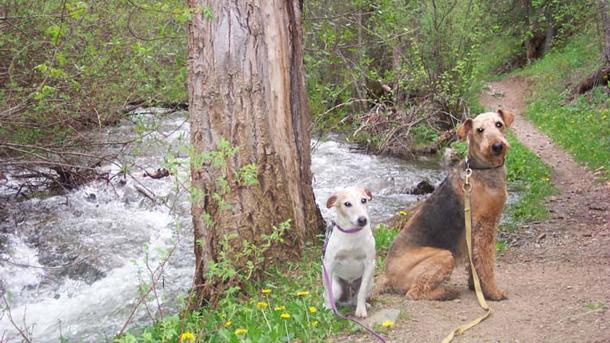A message for dog owners enjoying the great outdoors: Leave no poop behind
A study in Virginia found that 42% of controllable bacteria in a local river came from dog waste.
The majority of dog owners dutifully pick up after their pets in cities or neighborhoods, but sometimes they forget or don’t think about it when out in nature. Though this may not seem like a big deal, some experts say our dear dogs may pose a public health problem for nature — and for us.
Wes Siler is a contributing editor at Outside Magazine who recently wrote about all the poop that America’s nearly 90 million dogs generate. “We're talking about over 20 billion — with a “B" — pounds a year of dog poop,” he says. “It’s on a huge scale, which is a massive problem.”
That's 20 billion pounds a year in the United States alone, by the way.
Like the human variety, Siler says, dog poop is full of nasty stuff like E. coli, fecal coliform and potentially even parasites, if a dog is unhealthy. Also, “dog poop is transporting foreign nutrients on a massive scale into the wilderness,” Siler explains. “It's full of nitrogen and phosphorus, which are the nutrients in fertilizer, so it's creating a nutrient imbalance in a wild ecosystem. That can lead to the ability for invasive species to grow or create algae blooms in water, which kills fish.”
Siler based his article on two major studies that looked at dog poop’s effect on its surroundings. A wilderness educational organization called Leave No Trace, which published an article explaining the differenece between wildlife poop and pet poop, did a study in Boulder, Colorado which found that in parks and on public lands in the city about 27 percent of dog owners don’t pick up their dog’s poop. Another study done in Northern Virginia did DNA analysis of bacteria found in a stream and found that dog poop was responsible for 42 percent of foreign, harmful bacteria.
While picking up poop with plastic bags and throwing it in the trash sends it to a landfill, Siler says this is preferable to leaving the poop outside. Better still, he says, do with dog poop what you do with your own poop when camping in the wild: “Dig a six to eight inch deep cat hole and bury it in the top layer of the soil,” he suggests. “In the top layer of the soil, there are bacteria designed to break down poop, so the poop disappears. Dig that little hole, kick the poop in it — job done. It takes two seconds.”
Like most dog owners, Siler had not really thought about dog poop as a potential environmental hazard. But then he started researching his article.
“The stuff I learned has really taught me that we do need to be picking up the poop,” he says. “Think about a pristine environment: Altering it in any way does alter it, and you scale that across 100 campers a year, 1,000 campers a year, 5,000 campers a year in that location, and all of a sudden it does become a real problem.”
This article is based on an interview that aired on PRI’s Living on Earth with Steve Curwood.
